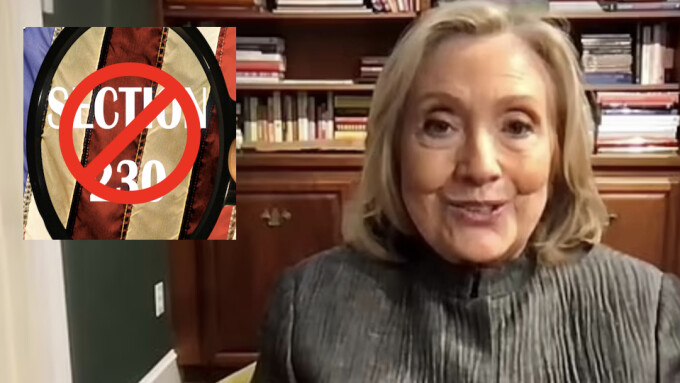WASHINGTON — Former Democratic presidential candidate, Secretary of State and First Lady Hillary Clinton gave an interview to CNN on Saturday as part of her campaign push on behalf of Kamala Harris, where she called for a total repeal of Section 230, known to digital rights activists as “the First Amendment of the internet.”
Under Section 230, internet platforms that host and moderate user-generated content — including adult content — cannot generally be sued for that content.
Speaking with CNN’s host Michael Smerconish, Clinton repeated her dislike for Section 230 protections, a stance she shares with numerous politicians of both parties, including both candidates in the 2020 presidential election. As XBIZ reported, both Donald Trump and Joe Biden openly and repeatedly advocated for the repeal of Section 230 during the 2020 campaign. Trump ultimately and unsuccessfully attempted to pass a repeal as an amendment to an unrelated bill during his chaotic lame-duck period between the election he lost and the Jan. 6 insurrection.
In Saturday’s interview, Clinton urged the upcoming federal administration to regulate social media based on legislation passed in California and New York, supposedly to protect minors from online harms.
“We need national action and sadly our Congress has been dysfunctional when it comes to addressing these threats to our children,” Clinton told Smerconish. “’It’s not just the social and psychological effects, it’s real harm. It’s child porn and threats of violence, things that are terribly dangerous. We need to have guardrails, we need regulation.”
Then Clinton added, “We should be, in my view, repealing something called Section 230, which gave, you know, platforms on the internet immunity because they were thought to be just pass-throughs, that they shouldn’t be judged for the content that is posted.”
Clinton deemed Section 230 — which has regulated internet speech since 1996, when her husband Bill Clinton was president — the product of an “overly simple view” that is not up to the challenges of current social media.
“If the platforms, whether it’s Facebook or Twitter/X or Instagram or TikTok, whatever they are, if they don’t moderate and monitor the content, we lose total control,” Clinton offered, without specifying who if the “we” meant the political class of which she has been a member the vast majority of her life, the government, the two-party system, people in general or another unspecified collective.
As The Daily Mail reported, a pro-Trump X account among the many voices from the right concerned about Clinton’s statement promptly responded “Who is ‘we’?”
Reason Magazine’s Elizabeth Nolan Brown commented that Clinton makes Section 230 protections “sound like some sort of aberration or anomaly.”
But since “a lot of platforms are basically ‘pass-throughs’ for the speech of others,” Brown added, “not holding them responsible for content they didn’t create themselves isn’t crazy at all. If a person on private property engages in speech that is somehow criminal, we don’t hold the property owner liable. If people use the telephone to hatch criminal plans, we don’t arrest the phone company. If I use a Sharpie and to write you a threatening letter and then send it in the mail, you can’t sue the makers of Sharpie or the U.S. Postal Service.”
Brown also lambasted Clinton for making “the ridiculous but all too common suggestion that social media companies aren’t actively monitoring and moderating content.”


